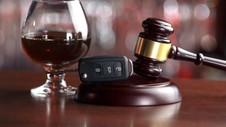Houston DWI Attorney
DUI Defense Lawyer in the City of Houston Defends Clients Against DWI Charges in Harris County, Fort Bend County, Montgomery County, and Throughout Texas
An officer can charge you with a DWI when there is probable cause to believe you were operating a motor vehicle and 1) the alcohol concentration in your blood or breath was 0.08% or higher, 2) a certain level of drugs was in your system resulting in impairment or, 3) the officer develops probable cause to believe that you had lost the normal use of your physical or mental faculties, usually shown during field tests.
Driving While Intoxicated (DWI) is one of the most common offenses in the State of Texas and it often involves people with no criminal record. Penalties, however, can be severe. In Texas, driving while under the influence of alcohol or drugs can result in jail time, fines, and loss of driving privileges.
In addition to potential fines and jail time, first-time DWI offenders are required to complete a 12-hour DWI Education Program within 180 days of when probation was granted. If the offender fails to do so, he or she may have his or her license revoked.
A Driving While Intoxicated charge will affect an individual outside of the courtroom as well. Insurance rates are affected. Employment opportunities may be limited, especially if driving a company automobile or truck is part of the job responsibility. Upon conviction of a DWI, the Texas Department of Public Safety (DPS) will impose a surcharge of up to $1500 a year for three years.
Facing Criminal Charges in Texas and Have Questions? I’m Houston Criminal Defense Attorney Ed Chernoff, And I Can Protect You. Call My Office Today at 713-222-9141 or Fill Out My Online Contact Form For a Free Consultation About Your Case.
In most cases a DWI is charged as a misdemeanor. Two prior convictions for Driving While Intoxicated will result in a felony charge. A felony DWI charge is serious. If you have been charged with a felony DWI, it is in your best interest to act quickly and hire a Houston DWI attorney. You need a Houston DWI attorney working for you that is experienced and will aggressively fight to help ensure the best possible outcome of your case. There are ways to avoid prison.
There are a number of other ways you could be charged with a felony Intoxication offense:
- DWI with a child passenger under 15 years old
- Intoxication assault, serious bodily injury resulting from an accident
- Intoxication manslaughter, death resulting from an accident
At Chernoff Law, we use every resource available to build strong defenses against your charge. As a founding member of the DUI Defense Lawyers Association, Ed Chernoff will use his years of experience to make sure you receive the best possible outcome in your DWI case.
First-Time DWI Charge
Being charged with a first-time DWI offense can be frightening and confusing. Spending 18 hours in jail waiting to see a magistrate and be released is often a life-changing experience. The best way to relieve your worries is to become educated about the process and the possible penalties you might face. Then it is time to stand up and fight! No matter the circumstances of your arrest, you do have a defense.
There are two tracks a lawyer must take with your DWI defense. One is through DPS and the other in County Court. Even though you were informed by the arresting officer that you had lost your driver’s license, and he might even have seized your DL card, your privilege to drive was not suspended at the time of your arrest. It is important to fight this suspension and the first step is to request a hearing. A good Houston DWI attorney will know how to do this and how to fight your case at a hearing before the State Office of Administrative Hearings.
The criminal case will be litigated in County Court. How you and your case is treated depends on the facts of your case, including whether there was an accident, whether there was an open container in your vehicle and your presumptive alcohol level. It also depends on the quality and reputation of your lawyer. If you are facing a first-time DWI charge, contacting a Houston DWI attorney right away could be one of the smartest decisions you make. At the firm of Chernoff Law, we will use our considerable knowledge of Texas DWI law and exemplary reputation to obtain your most favorable outcome. We will work tirelessly to research all aspects of your case so that judges and prosecutors are aware of important details that might help obtain a dismissal or reduce penalties.
What to do in a DWI Accident Case?
Being involved in an accident is a frightening experience. It is even more terrifying when you are suspected of being intoxicated. Prosecutors view an accident DWI more severely than one resulting from a simple traffic stop. You need strong representation. If you have been injured or involved in an accident leading to your arrest for drunk driving, it is important for you to immediately call an experienced legal team to ensure that your rights are protected.
At Chernoff Law, we know that officers can misinterpret signs of intoxication after an accident. After all, you were likely shaken up afterward, and asking you to do field tests immediately after a traumatic experience is unfair. The accident itself may be unrelated to any intoxication. However, officers are likely to look for a connection when an accident has occurred.
In some DWI accident cases, a person involved in the DWI accident is so injured that they become disoriented and unaware of what is happening. This, along with many other factors, may cause an incorrect accusation of drinking and driving. Your bewildered state, put together with the possibilities of the time of day or night this took place, visibility on the road, any mental or physical ailments or medications could have all contributed to this false arrest. You need a strong DWI lawyer in situations like these.
In addition to being charged with a criminal offense, you may also find that the other party in the DWI accident has filed a civil lawsuit against you. As such, ensuring that you have a lawyer by your side from the very beginning is extremely important. Call our firm today to learn how we can help protect your rights, your driving privileges and your financial future after you have been accused of causing a DWI accident.
DWI and Drugs
The charge of DWI does not only apply to operating a vehicle after having consumed alcohol. Intoxication means not having the normal physical or mental faculties due to alcohol or drugs in your system, or a combination of both. The primary concern with drugged driving is that the operator of the vehicle could have impaired motor skills, judgment, and reaction time. The penalties for driving while under the influence of drugs (DWI and drugs) are the same as for an alcohol-related DWI.
If you are pulled over by an officer, either at a regular checkpoint or due to suspicion of DWI, an officer can administer field sobriety tests if he feels there are signs that you may be under the influence of drugs. If the officer has probable cause to believe you are driving under the influence of drugs, he can arrest you and search your vehicle. This could result in a further charge of drug possession, which could have more serious consequences. A Houston DWI attorney will be able to review your case and lay out the best course of action for your defense.
Are the Penalties for Boating While Intoxicated the Same for DWI?
Texas has more miles of inland waterways than any other state. Many people take advantage of this by traveling the waterways with boats and jetskis. A boat is a motor vehicle. As a result, if you are believed to be operating this motor vehicle while intoxicated, you can be charged with Boating while Intoxicated or Boating Under Influence. The same 0,08% alcohol concentration is applied as in n automobile DWI.
A BWI charge can result in the same DWI penalties that exist for drivers who operate an automobile while under the influence. In addition, your boating license can be suspended. If you have been charged with BWI, it is important to contact a Houston DWI attorney as soon as possible to start exploring your legal options and mounting a strong defense.
What is DWI with Injury and Intoxication Assault?
In Texas, if you are found to have caused serious bodily injury to another while driving under the influence of drugs or alcohol, you could be charged with intoxication assault. Serious bodily injury means that the injured party suffered a substantial risk of death or serious, permanent disfigurement. This also includes prolonged loss or impairment of any part of the functions of the body.
As intoxication assault involving a DWI with injury is a third-degree felony, the penalties are very harsh. You could be fined as much as $10,000, and your license will be suspended from 180 days to 2 years. You may face anywhere from 2 to 10 years in jail. A Houston DWI attorney should be consulted immediately if you have been charged with a DWI involving injury to another, as it is important to protect your rights from the very moment you are charged.
The consequences of being charged with a felony DWI, be it intoxication assault or repeat DWI, can dramatically affect the rest of your life. We at Chernoff Law feel it is important for you to have an attorney that will do everything they can to help you with this very complex and serious legal issue. There is no need to risk your future by hiring an inexperienced lawyer who is unfamiliar with all aspects of the law and is unsure of how to effectively defend you. Ed Chernoff is a founding member of the DUI Defense Lawyers Association. He is board certified in Criminal Law. He can help you minimize the damage from an arrest for intoxication assault.
What is Intoxication Manslaughter?
According to the National Highway Traffic Safety Administration, more than 10,800 people died in alcohol-impaired driving crashes in 2017 in the United States. This number represents one-third of all motor crash fatalities in an average year, and these crashes cost our society more than $240 billion every year. In Texas alone, 39% of the fatalities in road accidents come from drink driving It is for this reason and others that Intoxication manslaughter charges are prosecuted so heavily under Texas law.
When a person causes the death of someone as a result of operating his vehicle while intoxicated, he is likely to be charged with the crime of Intoxication Manslaughter. In order to prove this case against an accused, the prosecutor must show beyond a reasonable doubt not only that the individual was intoxicated, but that the death was a direct result of that intoxication.
Practically, all accidents that result in the death of an individual will be investigated more thoroughly than a traditional Driving While Intoxicated case. What this means is that even if an individual refuses a breath test, the investigation officers will obtain a blood sample from the accused. This may be by search warrant, but in the case of a death, it not need be.
In Intoxication Manslaughter cases, the argument over intoxication will likely be over the procedure, method, accuracy, and authority of the blood test. If you are charged with intoxication manslaughter, it is absolutely vital that you are represented by a criminal lawyer who has tremendous experience in how to attack the government blood test evidence. Ed Chernoff has negotiated hundreds of dismissals on DWI cases, and has successfully attacked blood tests at trial. He understands the science behind blood alcohol testing and knows how to attack the science.
I don’t have the words to express how grateful we are for Mr. Chernoff and his team. They always kept us updated and were available for any questions we had. They were able to obtain the best possible outcome. I would definitely use him again and highly recommend him.
Ed saved my life and career. Incredible lawyer if you’re in trouble.
He put my fears at ease and helped me get my case dismissed and my life back on track. I would highly recommend hiring Ed and letting him do the same for you.
DWI or DUI?
DWI and DUI are often interchangeable terms in conversation, but they are different crimes. In Texas, Driving under the influence (DUI) is a term often used in juvenile cases and refer to any concentration of alcohol or drugs in an underaged driver. Any case involving driving while impaired or intoxicated, either from drugs or alcohol is considered a DWI.
Is Underage Juvenile DUI a Serious Crime in Texas?
According to the National Highway Traffic Safety Administration (NHTSA), teens are at a far greater risk of death in alcohol related crashes. A Juvenile DWI prosecution takes into account that juveniles possess the dangerous combination of low tolerance to alcohol with a lack of maturity that would enable them to understand the danger.
The State of Texas has a zero tolerance law for drivers under the age of 21. A driver who is under 21 can be charged with Driving Under the Influence (DUI), even though their BAC may be less than .08%. Having any detectable amount of alcohol in the system is cause for a DUI.
If the minor has a BAC of .08% or higher, they could be charged with Driving While Intoxicated (DWI) which has more severe penalties. In either case, a Houston DWI attorney like Ed Chertoff should be consulted to ensure that the correct legal procedure is being followed and there are no violations of the minor’s rights.
If you are an underaged driver and have been cited for DUI, you need to understand what is at stake. You must immediately respond in court for the criminal charges and, depending on the circumstances of the arrest, take affirmative measures to defend your driving privileges with the Department of Public Safety (DPS).
Fortunately, there are effective defenses available that will help you. However, you must act fast. Your license, in particular, will be in great danger if you don’t take immediate action. Contact a DUI Attorney at Chernoff Law and let us use our experience and legal knowledge to protect your license and juvenile record.
What are the DWI Penalties in Texas
The purpose of the strict DWI penalties in Texas is to deter people from drinking and driving. If you have been charged with DWI, it is important to understand the penalties that apply to your case. General outlines of the penalties are covered here, however, they can be complex and you may not understand the full consequences of their effect on your future. A Houston DWI attorney can explain them to you and pursue the minimum possible penalties that apply to your case.
| Type | Felony or Misdemeanor | Penalty |
| 1st DWI Offense | Class B Misdemeanor | Fine up to $2000 72 hour – 180 days in jail Driver’s license suspended for up to 1 year |
| 2nd DWI Offense | Class A Misdemeanor | Fine up to $4000 30 days – 1 year in jail Driver’s license suspended for up to 2 years |
| 3rd (or subsequent) DWI Offense | Felony | Fine up to $10,000 2 – 10 years in prison Driver’s license suspended for up to 2 years |
| DWI with Child Passenger Under 15 | Felony | Fine up to $10,000 180 days – 2 years in jail License suspension |
| Intoxication Assault | Felony | Fine up to $10,000 2 – 10 years in prison Driver’s license suspended for up to 1 year for the first time |
| Intoxication Manslaughter | Felony | Fine up to $10,000 2 – 20 years in prison Driver’s license suspended for up to 2 years |
Will I Lose My License?
When a person is arrested for a DWI offense the officer likely will take the driver’s license card from that person. Many clients mistakenly believe that the mere confiscation of that card means they may not legally drive in Texas. However, the privilege to drive remains even after the card winds up in the officer’s pocket. The “privilege” to drive is an amorphous permission granted by the State of Texas through the Department of Public Safety. The driver’s license card is merely proof of that “privilege”.
Texas is an implied consent State. This means, the granting of the privilege to drive carries with it the implication that the driver consents to the taking of a breath test if requested by a peace officer. Nonetheless, an officer cannot force someone to blow into a machine and if an accused citizen refuses, DPS is authorized to suspend the privilege to drive for 180 days for a first offender. Repeat offenders or people with repeat “contacts” with law enforcement can expect greater suspension terms.
The decision on whether to take a breath test presents a Cornelian dilemma to the accused citizen. If he refuses, DPS will try and take his license. If he consents to take the breath test and the breath test machine registers over .08 breath test concentration, DPS is still authorized to suspend the person’s driving privilege, albeit for only 90 days for the first offender. Both the refusal to take a breath test and the “failure” of a breath test authorizes DPS to suspend, but despite what many lawyers believe, a suspension is not automatic unless the accused citizen fails to contest it. In such a case, the suspension becomes effective 40 days after the arrest.
However – and this is important – the citizen does have the right to contest the suspension. If requested, a hearing will be scheduled at the State Office of Administrative Hearings.
Senselessly, some lawyers don’t bother fighting the license suspension. We at Chernoff Law fight suspension as often this is a way to a dismissal of a DWI charge.
The second way an accused person can lose his license is somewhat simpler. In addition to an Administrative License Revocation, an accused person can lose his license upon final conviction of DWI from anywhere between 90 days and one year.
Should I go into Pretrial Diversion Program?
Like other types of misdemeanor offenses, some counties like the Harris County District Attorney’s office offer first-time drunk driving offenders the possibility of avoiding severe DWI penalties by taking part in a Pretrial Diversion Program. Depending on the circumstances of your arrest, entering the Pretrial Diversion program may or may not be in your best interest. The benefit of a Pretrial Diversion Program is that if an accused completes the conditions of the program, he will be able to have his case dismissed after a year. The burdens are not so obvious.
Come to Chernoff Law for a confidential consultation with a Board Certified DWI attorney to discuss the situation and determine the best strategy for defending your rights. Ed Chernoff is a former Harris County Chief Prosecutor in County Court and has over 25 years of criminal law experience. He can explain the Pretrial Diversion and discuss whether it is right for you.
A pretrial diversion consists of signing a contract with the District Attorney, under which you will be required to perform every step of the program in exchange for having the charges against you dropped. Not everyone is eligible for the program, as it is reserved for first-time DWI offenders who have no prior criminal arrests.
The program includes several aspects, including classes intended to prevent future drinking and driving, installation of an ignition interlock device, attendance at mandatory alcohol treatment, community service, urine checks, and reporting to a probation officer.
In the event that the D.A. has probable cause to believe that you have violated the terms of the agreement in any way, you may be convicted of DWI and subjected to a full sentence.
Why is it Important to Hire an Attorney and Proper Defense Strategy?
Being charged with DWI is a very serious matter. It is vital to have a lawyer that is willing to fully investigate your case and work to try and minimize the penalties on your behalf. There are many different aspects to each case, so your defense should be individualized to you specifically.
At Chernoff Law, Ed Chernoff will hire your DWI personally. He is Board Certified in Criminal Law, and he will utilize every resource available to reduce or dismiss your charges. You need the involvement of an experienced Houston DWI attorney before you make any key decisions regarding your DWI offense. You need someone like DWI Lawyer Ed Chernoff.
What is Reasonable Suspicion for a Traffic Stop
It is unconstitutional for an officer to stop a vehicle without cause. Even in those instances where the police have set up road checkpoints, they must have a significant police reason and follow a set pattern in order to avoid running afoul of the U.S. Constitution. If the stop is without cause, all the evidence that is accumulated thereafter to prove a person was Driving While Intoxicated will be suppressed.
Probable Cause to Arrest
An attack on the officer’s stop can be a powerful way of defeating the State’s Driving While Intoxicated case, but it is by no means the only way of defending a DWI case. Even if the peace officer had cause to stop for a traffic violation, he may only seize a person on the side of the road for the amount of time necessary to effectuate the purpose of the stop. Unless the officer has reasonable suspicion to believe the driver he has stopped is intoxicated, he must issue his ticket and release the driver.
If the officer has no information to believe the driver had been drinking alcohol or was otherwise impaired, he cannot then continue on with his investigation. In other words, an officer cannot just ask just any driver to stay on the side of the road and submit to embarrassing field sobriety tests.
Keep in mind that in Texas an accused citizen has a right to present constitutional violations both to the Judge and Jury, when there is a fact issue about the stop or continued detention. There have been many instances where we have successfully contested the stop and detention, and have prevailed during a jury trial even though the evidence showed our client to be clearly intoxicated. The lesson to be learned here is that the Constitution always trumps guilt.
Chernoff Law is Committed to Answering Your Questions. I Offer a Free Consultation and I’ll Gladly Discuss Your Case With You at Your Convenience. Contact Me Today to Schedule an Appointment.
Driving While Not Intoxicated
By far, the most successful way to defend a DWI case is by attacking the opinion of the officer that the driver was intoxicated in the first place. In Texas, intoxication is defined as the loss of one’s mental or physical faculties as a result of alcohol or some other intoxicating substance. An officer’s information in that regard is limited. His opinion on whether a person has lost normalcy is based only on what he hears and sees at the scene of the stop. He has no information about the driver’s true physical and mental abilities, and unless the driver made some admission, he doesn’t know how much he had to drink.
With the exception of the driver who is so drunk that he stumbles out of his car and falls to the ground, the officer must develop his opinion of intoxication by giving field sobriety tests that he learned in DWI school. Although helpful, these tests are flawed. The National Highway Traffic and Safety Administration (NHTSA) developed them thirty years ago to aid peace officers in identifying intoxicated individuals. Even NHTSA recognizes that these tests aren’t foolproof.
By this scoring system, one could perform the test 90% correctly and still be considered a “failure”. Nobody practices balancing on one leg or walking heel to toe. It seems to surprise many police officers we cross-exam that the vast majority of citizens, including Jurors, question whether they could do these tests in even the most ideal circumstances.
The Horizontal Gaze Nystagmus, often called the pen test, is particularly nefarious. This test involves the officer shining a pen light eighteen inches from a citizen’s head and asking him to follow the tip with his eyes. Many people have a natural jerking in their eyes that mimics the effect caused when a central nervous system is introduced into the body. The officer, not medically trained, would not know whether he was testing such an individual.
Are you Required to Take a Breath Test?
If a client has taken a breath test it is absolutely vital that his or her attorney understand both the procedure used to obtain the specimen of breath and the way the machine measures that specimen. It has been our experience that, absent an effective defense presentation describing the frailties of the machine and the State’s breath-testing program, Juries have a tendency to believe the results of a breath test. Discussions with jurors after trials show that most walk into court with the impression that the State has done its necessary due diligence with regard to the machine used in State breath testing and has sufficiently trained its officers to give the test. They are shocked when presented with the truth.
However, the truth will not set that accused citizen free unless DWI defense counsel is prepared and able to present that truth. In many cases, the defense will need to present an expert to introduce evidence of the machines failings. In every case the DWI lawyer must know how to carefully and effectively obtain contrary information from the expert presented by the State. The lawyer must be able to acquire and interpret repair and maintenance records. He must be conversant in the technical language and be able to call out a State witness who makes questionable claims about the efficacy of the test machine. Quite simply, the lawyer must know what he is talking about, or the jury surely will penalize his client.
Can the DWI Blood Tests be Challenged?
Police officers can obtain a blood sample from an individual arrested for DWI if they obtain a search warrant. This search warrant must be based on an affidavit establishing probable cause to believe the individual arrested was intoxicated. Sometimes these PC affidavits are insufficient because the preliminary investigation by the officer was lacking.
Many times, blood tests can be successfully challenged in a DWI case. If the alcohol swab used to sterilize the area of the blood draw is contaminated, this can affect the results. There is only one blood sample that is taken. If there is some problem with that sample, this may be used in your defense. If the preservative and anti-coagulant in the blood sample are not properly mixed, it can cause the sample to ferment. This can bring about an incorrect test result.
It is vital that your Houston DWI attorney understand the science of blood testing. Ed Chernoff is a Houston DWI attorney with the experience to cross-examine State experts. He has the ability and experience necessary to help you achieve a successful result.
























Reviews Matter
★
★
★
★
★
★
★
★
★
★
★
★
★
★
★
★
★
★
★
★

